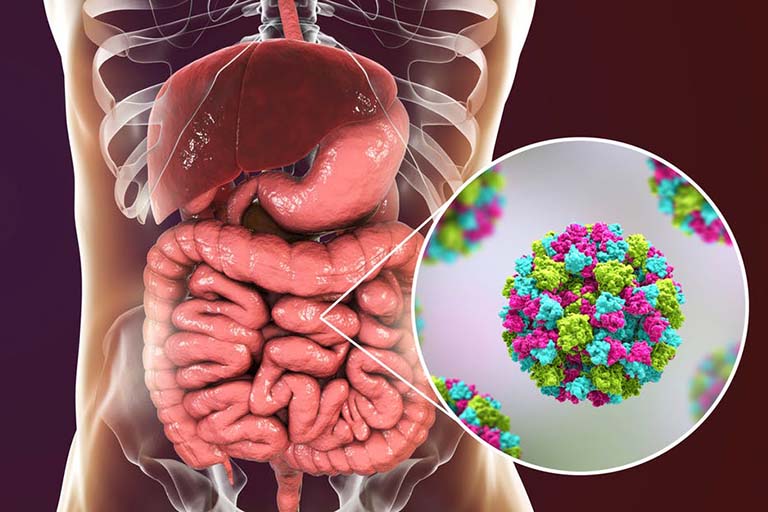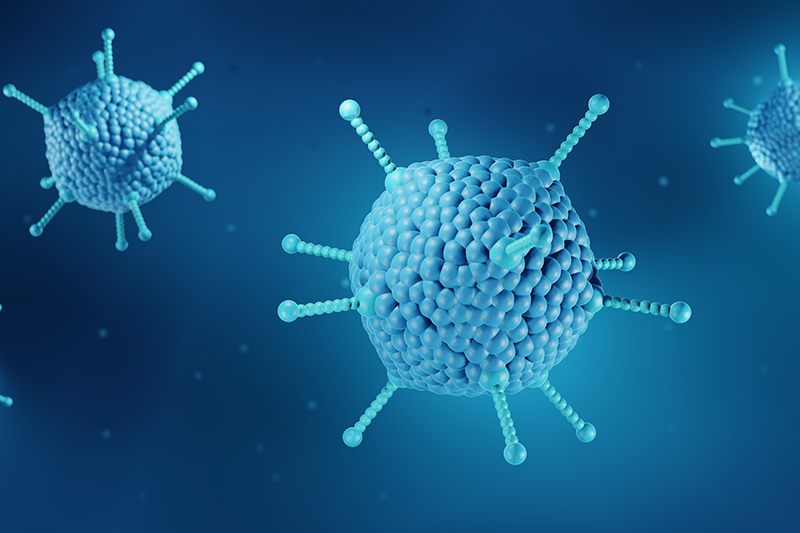Stomach flu is also referred to as viral gastroenteritis; it is an intestinal infection that comes with diarrhea, cramps, nausea, vomiting, and fever. Stomach flu often develops when you are in contact with an infected person or by consuming unhygienic contaminated food or water.
Watery diarrhea is the main sign of stomach flu. It’s better to prevent yourself from such an annoying infection that has no effective treatment. A healthy body can fight with it easily, but children and infants who have weak immunity may not be able to handle it, which can be life-threatening.
Stomach flu infection in your digestive system is very annoying and irritating and can be contagious. Nobody likes getting a stomach infection, but you need to sail harder once you get it.
Let’s read further in the article to know more about how long does stomach flu last, what its symptoms are, and how you can treat it.
How long does stomach flu last?
Any infection or disease that has attacked your body will linger for some time. This can make you sick, uncomfortable, and annoyed. When you are sick with the stomach flu, you become a regular visitor to the bathroom, and this makes you think how long does stomach flu last. The stomach flu generally lasts for 1 to 3 days.
In most cases, it may linger for up to 10 days, especially for people who are older adults or have certain medical conditions. Norovirus is considered the most common cause of stomach flu in adults, which remains contagious for several days or more than a week even after the symptoms subsides. The most common cause of stomach flu in adults is norovirus, which can be contagious for several days after the symptoms subside.
Depending on the immune system viral gastroenteritis may disappear within 1-3 days of infection. how long does stomach flu last depends on the symptoms, which can range from mild to severe. If it is mild, it goes away within three days, but severe infection takes time to heal, and it can take 15 to 20 days to go away.

Causes of stomach flu
The main cause of stomach infection is the inflamed lining of the stomach and intestinal walls, especially in the small intestines, inflammation is the way the immune system combats against the virus. If the infection is severe, the immune system behaves strongly with systemic symptoms, which means that the occurrence of symptoms from inflammation outside the digestive system to other body systems, isn’t the best way for your immune system to respond to the virus.
There are different viruses that can cause viral gastroenteritis. Some of the most common causes with how long they last are listed below:
1. Norovirus
It is a contagious virus that can cause vomiting and diarrhea, and with this virus, anyone can get infected. This is also called stomach flu or stomach bug it is different from the illness caused by the influenza virus how long does a stomach infection from norovirus last depends on the severity although the symptoms usually begin 12 to 48 hours after being infected the virus can last for 1 to 3 days however the person can feel sick for about 6 days but gradually gets rid of the virus.

2. Rotavirus
It’s a very unpleasant stomach infection that affects your intestine and stomachs the symptoms of rotavirus usually begins after 2 days a person being exposed to rotavirus, a person may asses the symptoms of severe water diarrhea, vomiting, fever, and abdominal pain stomach infection from rotavirus can last for 3 to 8 days. If anyone gets infected with a rotavirus stomach infection, it is necessary to maintain proper intake or feeding of fluids to prevent dehydration. It is a contagious virus that causes diarrhea.
3. Adenovirus
It is a group of infections that affects your body, especially the respiratory system and digestive system it affects Gastrointestinal tract causes diarrhea, nausea, and vomiting, the symptoms usually after 3 to 10 days you get infected with the virus, and this may prolong 2 weeks

4. Astrovirus
It is an infection that takes place through contaminated food and water. Infants and young children are most likely to develop symptoms such as diarrhea, nausea upset tummy; it does not cause any severe effects and gets cured on its own without any medical treatment, although it can last for 3 to 5 days.

Symptoms Of Stomach Flu
Below are listed a few symptoms of stomach
- Watery diarrhea
- Vomiting
- Stomach cramps
- Loss of appetite
- Mild fever
- Feeling nauseous
- Fatigue
- Dehydration
- Flatulence
- Gagging
In stomach flu cases, symptoms can worsen when you have vomiting. It can be very frequent. However, the vomiting can stop within a day or two. You may feel worse because of diarrhea as it can last for a long period can cause dehydration, and can make you sick.
Adults can survive and manage stomach flu on their own, but toddlers are real patients of the stomach as they vomit frequently for 24 hours it usually stops in 24 hours, but the diarrhea from stomach flu can prolong 2 to 3 days. While suffering from diarrhea, remember that it causes dehydration, so it’s necessary that you maintain the intake of fluid to keep yourself and your toddlers hydrated.
Sometimes the stomach flu symptoms worsen and persist for a long time which is around 10 to 12 days. In some instances, these symptoms may persist for up to 10 days. There’s no proper treatment for viral gastroenteritis; you need to help yourself as you know that prevention is better than cure remember to stay hygienic, avoid consumption of food and water that is outsourced and can be contaminated, consume home-cooked food only, eat healthy food to improve symptoms of stomach flu and most importantly wash your hands thoroughly and often.
Any problem to your health must be dealt with carefully as it could be life-threatening if left untreated although stomach flu is not a very serious problem, people who have strong immune systems can handle it smoothly but are not so healthy, or people with weak immune system must take care of stomach flu it can be dangerous especially for aged adult and infants.
How Can You Treat Stomach Infection
1. Be On Fluids
When you are going through a stomach infection, it’s necessary that you maintain the proper balance of fluids, especially when you are vomiting and having diarrhea. Consuming fluids is the best way to treat stomach infections for people of all ages.
Infants and children still nursing should continue breastfeeding. Breastfeeding is best for infants and children because it provides essential nutrients and replenishes the fluid lost due to diarrhea or vomiting.
Young children, adults, and older adults must consume plenty of fluids like water, clear fruit juices, sports drinks, coconut water, and electrolyte drinks.
If a person sick with a stomach infection does not maintain hydration or keep the fluids down, they have a high risk of dehydration.

2. Make Dietary changes
To treat stomach infections, you must take good care of what you are eating. Consuming spicy or heavy foods may worsen the stomach infection. It is recommended to consume a BRAT diet, which includes:
- Bananas: they are rich in water, fiber, and other essential elements. Consuming bananas promotes regularity and digestive health it also replenishes the electrolytes and water lost while dealing with diarrhea.
- Rice: it is rich in fiber, and consuming rice helps support gut health and reduce inflammation. It processes easily and provides energy.
- Applesauce: it’s a great energy source containing carbs, sugars, and pectin that treats diarrhea-related issues. It’s also easy to digest.
- Toast: white bread calms a sore stomach, and the starch works as a binding agent without the fiber that would encourage elimination.

3. Take Proper Rest
Continuous visits to the bathroom can make you feel tired and exhausted, so rest is compulsory. It also reduces the risk of spreading infections.

4. Consuming ginger is best
It is known as the best natural remedy to treat digestive issues and stomach flu; it contains magical properties. Consume ginger tea twice a day to get relief from nausea. It also helps in reducing inflammation. It is the best way to treat stomach flu infection.

Benefits Of Probiotics
To treat stomach clue infections, consuming probiotics is the best option. It aids in digestion and maintains good balance adding yogurt or kefir to your body does not support your body’s recovery, but it provides relief from the infection. Probiotic consumption promotes gut health and treats infection.
What Does The Emergence Of Stomach Flu Feel Like?
As soon as you develop the infection in your gastro tract, you begin feeling the symptoms, your visits to your bathroom increase suddenly, you may feel like vomiting very often on the first day of infection, you may not want to eat anything, you feel tired and exhausted. You may have the stomach flu for two to three days. It gradually passes off on its own. Just eat light food cooked at home, consume plenty of fluids, and take a good rest.
How Long Are You Contagious?
Staying healthy is your duty towards your body when being infected with stomach flu, you remain contagious from the acute phase of the infection till you keep recovering from the virus as the virus subsides in your stool for up to two weeks or more after recovery. Old-aged, young adults and children should stay home from school or work for two to three days to avoid stress and infection.
How Common Is Stomach Flu?
It’s a very common infection worldwide once in a while, everyone suffers from it. The source of this infection is contaminated food and water that affects your gastro tract and also your whereabouts in public places contacting several people every day at various places infect you with viruses, and usually without knowing, you pass it to your tummy through your hands as you do not wash them often or do not think before consuming food and water from streets or crowded public places which results in stomach flu around 685 million people gets infected every year.
What Are The Stages Of Stomach Flu?
There are various stages of stomach flu although it doesn’t last for a long time, it has a short duration of three to five days moreover, it’s a contagious infection and lasts for a few days depending on the infected with what type of virus let discuss below about various stages of stomach flu infection.
1. Exposure
The primary stage of stomach flu is exposure. You can easily get infected as humans have to be social and remain every day in different environments and workplaces such as schools, colleges, railway stations, hospitals, restaurants, shops, etc. Which are hubs of various infections you cannot assess when you can get exposed as your body alarms you when you are already exposed.
2. Incubation period
As soon as you get infected, it begins to incubate inside your body for two to three days, which affects your immune system, and you remain contagious during this time.
3. Acute infection
When the symptoms are at their peak, it is sudden and temporary. The virus inserts your Gastro tract for 2 days, and by the third day, you feel relaxed. As soon as your immune system gets an alarm, it activates inflammatory responses to clear the virus and make you feel better.
4. Recovery Period
As soon as the symptoms begin to fade, no more cramps, nausea, and vomiting. Diarrhea stops eventually, and you feel better, but you remain contagious for a few more days as the virus continues to get out from your body through the stool.
Is Stomach Flu Contagious?
You must follow healthy and hygienic practices to protect yourself from disease and infections as stomach flu is really a contagious infection that you catch up easily. You can alert others if you suffer from this while being infected eat light food cooked at your home, wash your hands often, and do not share your belongings while being infected.
How Does Stomach Flu Spread?
Stomach flu is common around the globe; it spreads by the “fecal-to-oral route.” The virus can transfer to food and water sources; without knowing, you may infect yourself with the virus through contaminated food or water or by touching an infected person or surface and then touching your mouth.

When to Seek Medical Attention?
Stomach flu is an annoying infection. If it is mild, it cures in three days, but severe symptoms take time to heal. You must seek medical help if its severe and out of control
- experiencing signs of dehydration like thirst, dry mouth, inability to keep fluids down, and dark urine.
- If you have high fever if you notice blood in your stools
- Persistent vomiting for more than 48 hours, can cause complications.
- Feeling Extremely Weak or Dizzy
- Severe Abdominal Pain

